We Tested the 10 Best Formstack Alternatives for Efficient Form-Building
Quick Summary
We review top Formstack alternatives, covering options like Growform, Typeform, Paperform, and more. Discover how modern form builders like Growform streamline workflows, generate higher-quality leads, and increase conversions with multi-step forms. Visit our blog for more strategies on form building and lead generation.
Looking for Formstack Alternatives?
Formstack has been a popular choice for many, offering a way to create forms, manage workflows, and capture data.
But is it really the best solution out there for every business? While Formstack is a solid option, we’ve found that many businesses and users are looking for alternatives that better suit their specific needs.
In this Growform article, we’ll review the best Formstack alternatives to help you build better and more efficient forms for different purposes. We’ll highlight features, pricing, and more to help you choose a solution that meets the specific needs of your business.
But before we dive in…
Why Listen To Us?
Growform is your go-to platform for building effective forms for lead generation and data collection. With our powerful lead capture forms that embed almost anywhere, we’ve helped businesses boost lead generation by 2X and 3X. Businesses have also used our forms to score leads, personalize, and maximize conversions.
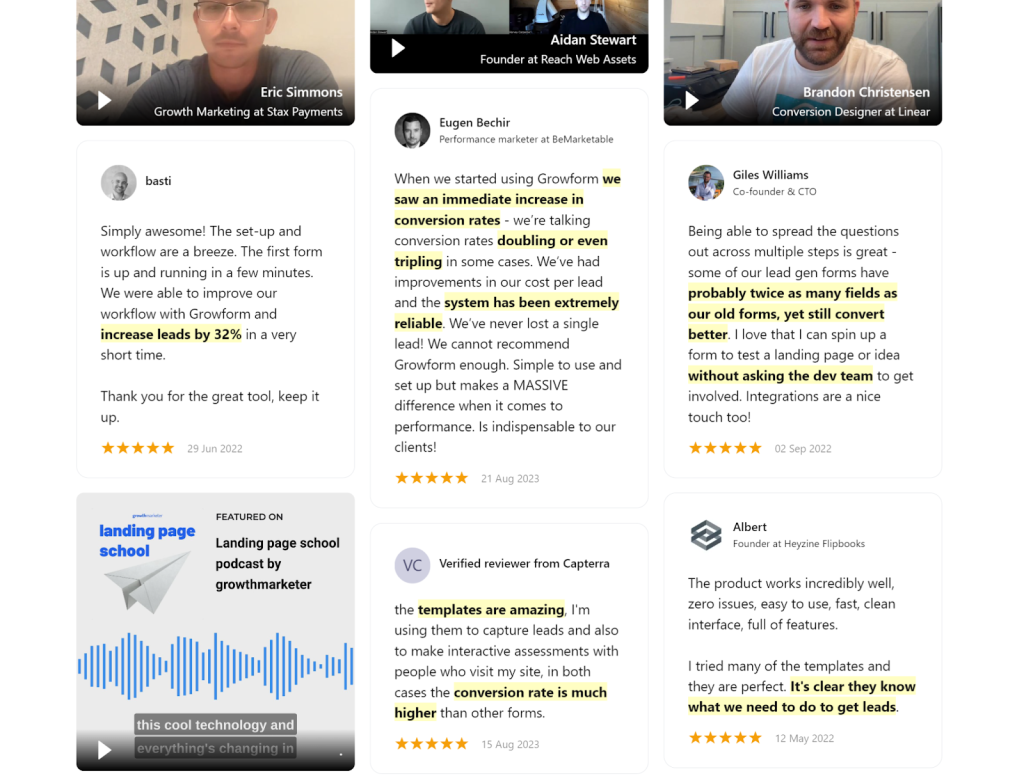
What is Formstack?
Formstack is an all-in-one platform designed to simplify data collection and workflow automation. It allows businesses to create custom online forms, surveys, and documents without any coding knowledge.

With Formstack, you get:
- Quick drag-and-drop form building
- Automated forms with minimal errors and discrepancies
- Data routing to central business systems for tracking performance
- Third-party integrations with CRM and ERP systems
Marketing agencies, web design firms, and growth consultants use Formstack to improve operational efficiency. However, depending on your specific needs, other tools might offer better functionality and features.
For example, businesses interested in lead generation may consider Growform. Stax Payments used Growform to automate their workflow and increased their leads by 32% within a very short period.
10 Formstack Alternatives To Capture More Quality Data and Leads
See a summary of the Formstack alternatives we cover in this article:
| Tool | Standout Feature | Free Plan | Pricing |
|---|---|---|---|
| 1. Growform | Multi-step forms with conditional logic | 14-day free trial | Starts at $47/month |
| 2. Typeform | Conversational one-question format | Available | Starts at $25/month |
| 3. Cognito Forms | Secure HIPAA-compliant data collection | Available (100 entries/mo) | Starts at $19/month |
| 4. Google Forms | Real-time collaboration on surveys | Available | Included in Google Workspace from $6.30/month |
| 5. Paperform | Document-like editor for branded forms | 7-day free trial | Starts at $24/month |
| 6. Jotform | Extensive template library | Available (5 forms, 100 submissions/mo) | Starts at $34/month |
| 7. Microsoft Forms | Excel & Teams sync for responses | Included free with Microsoft 365 | No standalone pricing |
| 8. Qualaroo | Nudges™ for contextual surveys | Available | Starts at $19.99/month |
| 9. SurveyMonkey | AI analytics + benchmarks | Available (basic version) | Starts at $34/month |
| 10. Zoho Forms | Offline + QR data capture | Available (with payments) | Starts at $10/month |
Related: We Tried the 10 Best Heyflow Alternatives for Lead Generation
1. Growform
The first Formstack alternative on our list is Growform. Growform is a form builder that simplifies the creation of complex, branching forms for seamless and effective data collection.

Unlike generic form builders, Growform is engineered specifically to help businesses capture more leads through beautifully designed multi-step forms. With our forms, businesses can help generate higher-quality leads—up to 2x more than traditional forms–and maximize conversion rates.
But that’s not all. Unlike Formstack, our tool is optimized for performance, ensuring forms look great on any device. It also has no-code functionality, which makes it accessible to users of all technical skill levels. Users can build their forms from scratch or use any of the several templates for different niches.
Key Features
- Drag and Drop: Growform lets you build complex multi-step forms without code. Just drag and drop fields and adjust settings to create forms that look great on all device sizes.
- Multi-Step Forms: Create and control the flow of multi-step forms by showing or hiding steps based on the input of the users.
- Conditional Logic: Dynamically show or hide fields based on previous responses to make forms more relevant and personalized.
- Integrations: In addition to instant email notifications out-of-the-box, Growform integrates with over 300 CRMs, email marketing tools, and databases for efficient data management.
- Customization: Design your forms to fit into your website’s look and feel using custom CSS and a host of other no-code customization features.
- Embed Your Forms: Embed any form you create into your website with custom HTML support, such as Instapage, Unbounce, and WordPress.
- A/B Testing and Form Analytics (Upcoming): Test different versions of your forms to see which performs best while tracking user interactions to identify drop-off points and optimize form performance.
Pricing

First-time customers can access all our features over a 14-day free trial period. After the trial period ends, they can subscribe to any of our four plans:
- Basic: $47/month – 300 leads, 3 active forms, removes Growform branding.
- Professional: $79/month – 1,000 leads, 15 forms, validation tools, compliance tracking.
- Scale: $159/month – 3,000 leads, 50 forms, advanced validation.
- Custom: Tailored plans for agencies with unlimited forms and thousands of leads.
Pros
- Simple, easy-to-use, no-code form-building interface
- Hundreds of customizable templates for various industries
- Extensive customization options, including CSS, to create personalized forms
- Seamless integrations with databases and CRMs
- Lead-capturing tools that increase conversion rates significantly
- Agency and consultant-friendly
Cons
- Understanding all the features may take a while
2. Typeform
Typeform is an online form-building platform known for its conversational, engaging, and interactive forms. It emphasizes user experience by presenting questions one at a time in a visually appealing format.

Due to its conversational style, it’s widely used by businesses for surveys, quizzes, lead generation, and data/feedback collection.
Key Features
- Engaging Forms: Customize forms with branded designs, videos, and follow-up questions based on previous answers, enhancing user experience and increasing completion rates.
- Deeper Insights: Use AI-driven data analysis to gather more in-depth responses.
- Seamless Integrations: Works with 300+ integrations, including Zapier, Google Analytics, HubSpot, and Slack.
- Custom Design: Personalize forms to match your brand, with options to embed anywhere.
- Templates and Free Plan: Access 3,000+ templates and create unlimited forms on the free plan.
Pricing
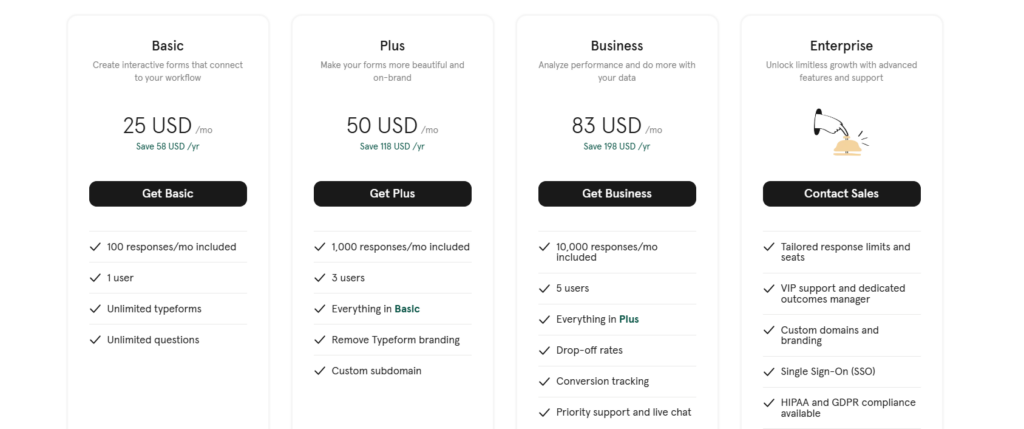
Typeform offers a free plan with limited responses, and 3 paid plan categories: Core, Growth, and Talent. Core plans (billed yearly) include:
- Basic: $25/month, 1 user, 100 responses/month.
- Plus: $50/month, 3 users, 1,000 responses/month, custom subdomain.
- Business: $83/month, 5 users, 10,000 responses/month, custom branding, priority support.
- Enterprise: Custom pricing for advanced needs and higher response limits.
Pros
- Conversational approach to form building
- Engaging forms increase engagement and response rates
- Customizable forms to match the brand’s identity
- Wide range of integrations
Cons
- No built-in analytics features
- Direct customer support could be more robust
3. Cognito Forms
Another alternative to Formstack businesses might consider is Cognito Forms.

Cognito Forms is a feature-rich online form builder known for its flexibility and ease of use. It’s ideal for businesses of all sizes, from freelancers to large enterprises. It lets users build forms quickly with a no-code interface just by adding fields and sections.
It is especially popular in industries like healthcare, nonprofits, education, and government due to its advanced data collection capabilities and compliance features like HIPAA, CCPA, and GDPR.
Key Features
- Payment Integration: Collect payments seamlessly via Stripe, PayPal, or Square directly within forms.
- Workflow Automation: Automate processes like approvals, form routing, and task assignments based on form inputs.
- Data Security: Offers advanced encryption, two-factor authentication, and HIPAA compliance for secure data collection.
- Integrations: Supports integrations with tools like Zapier, Power Automate, and Google Analytics for enhanced functionality.
Pricing
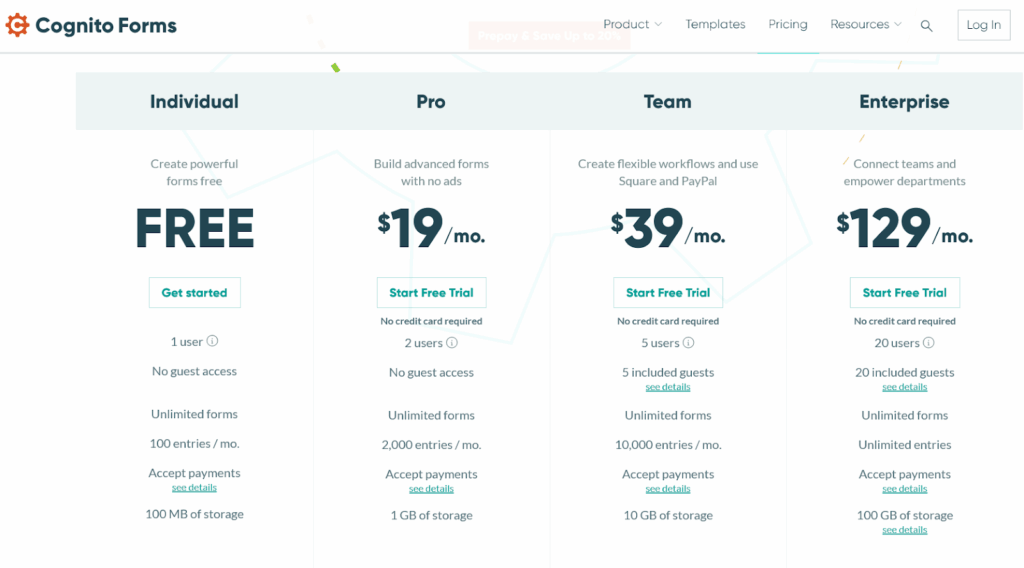
Cognito Forms offers a limited free plan with just 500 entries per month. For more, users can subscribe to any of the paid plans starting at $19/month.
Pros
- Advanced features like conditional logic and multi-page form
- Supports payment collection, which is available on all plans
- Supports HIPAA compliance and secure data handling
- Works well with third-party tools
Cons
- Setting up complex forms might be challenging for new users
- The free version has limited storage and limited entries
4. Google Forms
Google Forms is a free, simple-to-use tool within the Google Workspace suite for creating surveys, quizzes, and feedback forms. It’s ideal for basic data collection and integrates seamlessly with Google Sheets for easy analysis.

The tool supports conditional logic to allow dynamic question flow. Users can also choose from basic templates and themes for quicker and easier form creation. It also adheres to the same extensive privacy commitments and data protection as the rest of Google Cloud’s enterprise services.
Key Features
- Survey & Quiz Creation: Build surveys, quizzes, or feedback forms quickly.
- Real-Time Collaboration: Multiple users can edit forms simultaneously and share forms via email, link, or website.
- Google Sheets Integration: Automatically link responses to Sheets for easy data analysis.
- Customization Options: Choose from pre-designed templates and basic customization for form design.
- Custom Logic: Create dynamic forms that change based on user responses.
Pricing
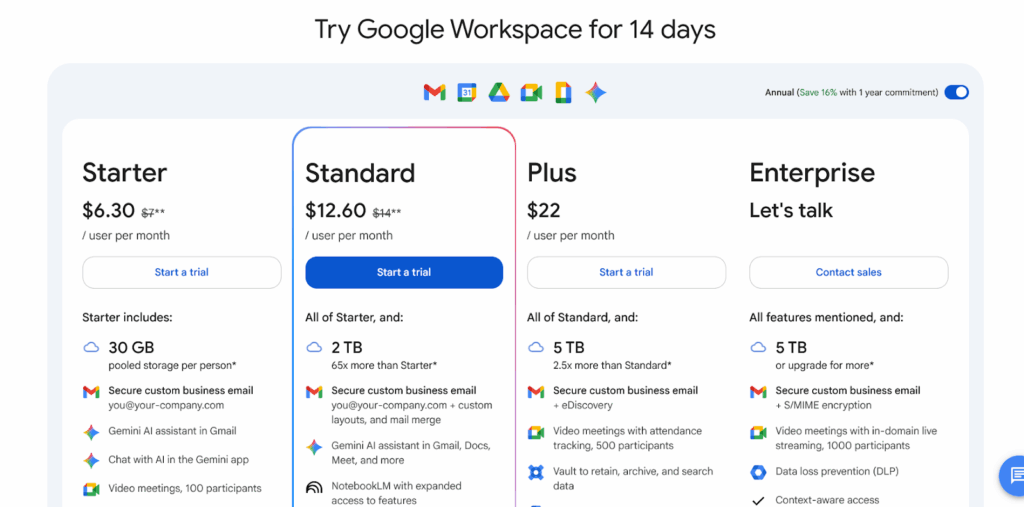
Google Forms is included as part of Google Workspace. It is completely free for personal use. Paid Google Workspace plans, starting from $6.30 per user/month, offer enhanced admin controls and cloud storage as part of its Google Forms package.
Pros
- Free to use
- Offers real-time collaboration
- Simple interface for creating quick forms
- Google Sheets integration for easy analysis
Cons
- Limited customization options
- Basic analytics compared to advanced form builders
5. Paperform
Paperform is a flexible no-code form builder. It’s designed to help small businesses, freelancers, and large teams create beautifully branded forms, landing pages, and even entire workflows without needing technical skills.

It allows users to collect payments, manage bookings, and automate processes with ease. Paperform’s interface feels more like editing a document, making it intuitive even for beginners.
Key Features
- User-Friendly Editor: Simple document-like interface for creating beautiful, branded forms easily.
- Built-in Analytics: Track form performance with data visualizations and custom reports. It also integrates with Google Analytics or Facebook Pixel.
- Automation: Automate workflows and payments with logic-based forms for tailored experiences.
- Scheduling Integration: Sync your schedules with Google Calendar and eliminate manual follow-ups for bookings.
- Customizable Design: Personalize forms with Unsplash, GIPHY, image editing, and custom themes.
Pricing
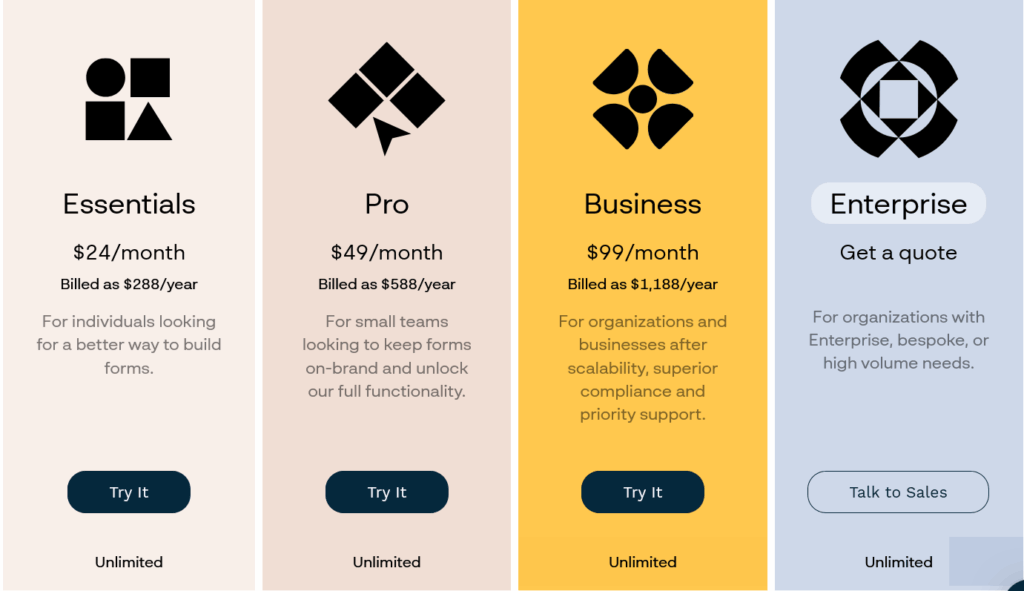
Paperform offers a 7-day free trial, and four subscription tiers billed annually:
- Essentials ($24/month): 100 submissions/month.
- Pro ($49/month): Higher submission limits plus domain integration.
- Business ($99/month): Even more submissions and advanced features.
- Enterprise (Custom pricing): Tailored for organizations with high-volume needs.
All plans offer an unlimited number of forms.
Pros
- Intuitive, document-like editor ideal for non-technical users
- Extensive built-in customization features
- Supports conditional logic
- Built-in support for payments
Cons
- No free plan
- Some users might find the interface overly simplistic
6. Jotform

Jotform is a popular online form builder that allows users to create customizable forms for various purposes. Users can create forms for surveys, event registrations, lead generation, and payment collection from scratch or choose from its vast template library.
For form creation, it offers a user-friendly drag-and-drop interface, making it suitable for users of all technical skill levels.
Key Features
- Customizable Form Builder: Create forms easily with a drag-and-drop editor, customizable with logos, fonts, and colors.
- Payment Collection: Accept payments through 30+ gateways like PayPal, Stripe, and Square.
- Integrations: Connect with several CRM, storage, payment, and email apps, including Google Sheets, Slack, and Salesforce.
- Automation: Automate workflows with approvals and conditional logic.
- Templates: Access 10,000+ customizable templates.
Pricing
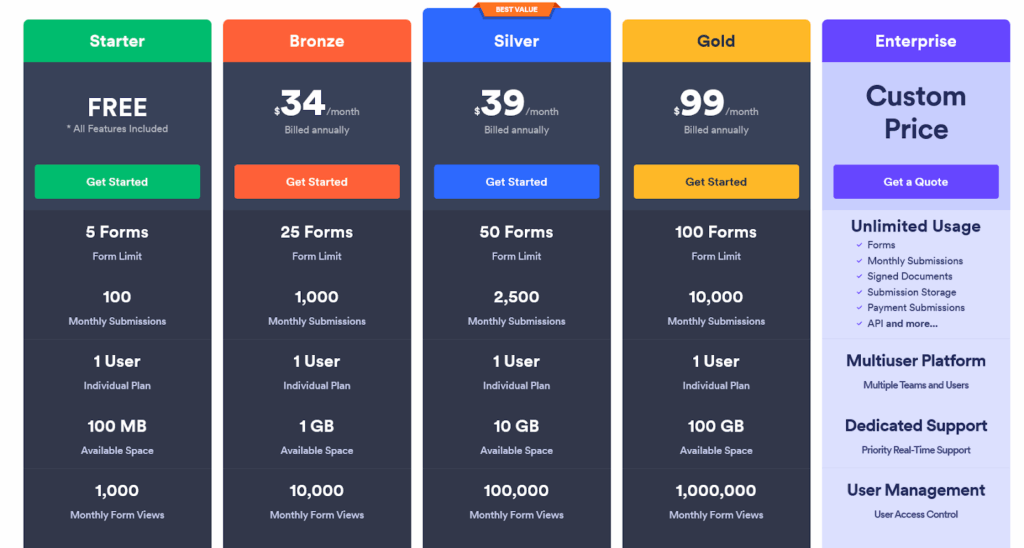
Jotform offers five different plans, including a free plan:
- Free Plan: 5 forms, 100 submissions/month.
- Bronze ($34/month): 25 forms, 1,000 submissions/month.
- Silver ($39/month): 50 forms, 2,500 submissions/month.
- Gold ($99/month): 100 forms, 10,000 submissions/month.
- Enterprise (Custom pricing): For large organizations needing advanced features and multi-user access.
All plans are billed annually.
Pros
- An extensive template library makes it easy for everyone to create forms
- Supports advanced features like conditional logic
- Payment and business app integrations
Cons
- Limited free plan
- Advanced features come with a learning curve
7. Microsoft Forms
Microsoft Forms is a lightweight form builder bundled with Microsoft 365 that allows you to build surveys, quizzes, and polls quickly. Its clean, beginner-friendly interface makes it accessible to non-technical users, especially those already in the Microsoft ecosystem.
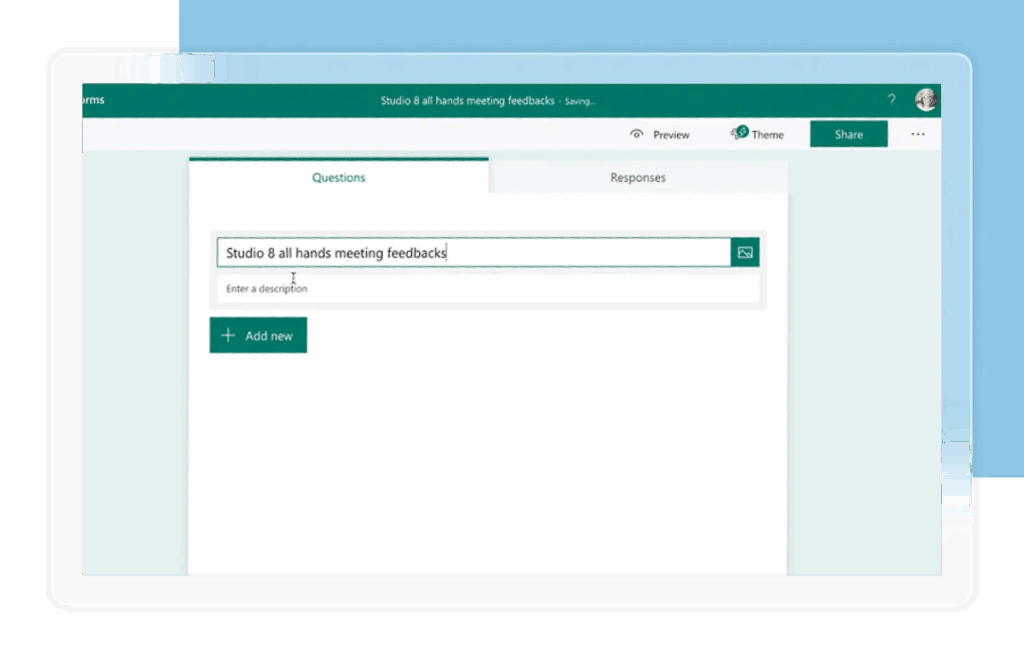
Responses sync automatically with Excel and Teams, making it easy to analyze data and collaborate. For businesses using Microsoft 365, it’s a cost-effective option for simple data collection.
Key Features
- Easy Form Creation: Enables fast setup via templates and simple question types.
- Microsoft 365 Integration: Exports data directly to Excel, works inside Teams, and SharePoint.
- Branching Logic: Adjusts questions dynamically based on user responses.
- Built-In Visuals: Automatically generates charts and graphs for instant response insight.
- Accessibility: Screen‑reader compatibility and keyboard navigation ensure inclusive use.
Pricing
Microsoft Forms is included at no extra cost with Microsoft 365 subscriptions, making it highly cost‑effective for existing users.
Pros
- Seamlessly integrates with Excel and Teams for quick workflow
- Simple interface lets non-technical users build forms fast
- Auto-generated charts help analyze responses instantly
- Branching logic guides respondents based on answers
- Accessible via screen readers and keyboard navigation
- No extra subscription needed
Cons
- Very limited design and branding customization
- Lacks advanced logic and mobile app support, frustrating for complex workflows
8. Qualaroo
Qualaroo is a user feedback and survey tool that captures insights in real-time through Nudges™: short, targeted pop-ups that appear while users browse your site or app.
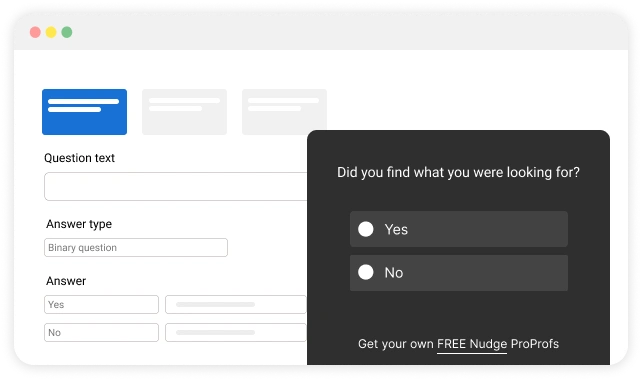
It’s designed to help businesses improve conversion rates, product-market fit, and user experience by asking the right questions at the right moment.
Key Features
- Nudge™ Pop‑Ups: Collect contextual feedback without disrupting the user journey.
- Advanced Targeting: Trigger surveys based on behavior, visit duration, exit intent, referral source, or location.
- Branching Logic: Personalize follow-up questions dynamically.
- Sentiment Analysis: Use IBM Watson AI to interpret open-ended feedback at scale.
- Multi‑Channel Support: Deploy surveys across websites, mobile apps, and prototypes like Figma.
- Integrations: Connects with HubSpot, Slack, Zapier, Salesforce, Intercom, Tableau, and more.
Pricing
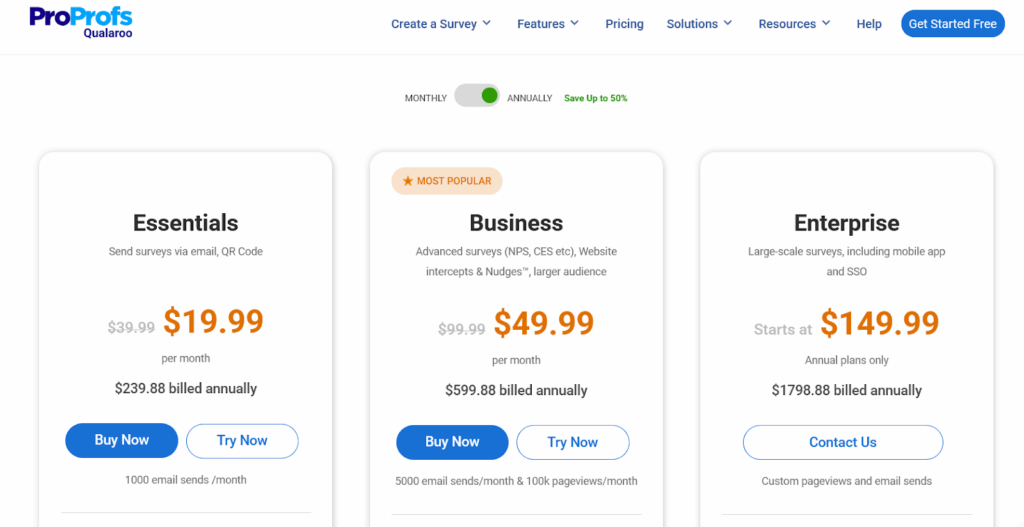
Qualaroo offers a Forever Free plan with limited features, plus paid plans that start at $19.99 per month. Enterprise plan includes unlimited responses, domains, users, advanced targeting, SDKs, APIs, and sentiment analysis.
Pros
- Advanced targeting hits users based on behavior and intent
- Real-time nudges boost response relevance and engagement
- Sentiment analysis speeds feedback interpretation
- Multi-channel deployment supports web, mobile, and prototypes
- Powerful branching logic tailors surveys to user paths
- Broad integrations avoid data silos and automate follow-ups
Cons
- Dashboard UI can feel basic compared to competitors
- Pricing scales quickly for advanced features
9. SurveyMonkey
SurveyMonkey is a long‑standing online survey platform that offers flexible tools for building surveys, polls, and quizzes for market research. It offers an extensive template library, real‑time response tracking, and collaboration tools, making it a top choice for teams that need quick, data-driven insights.
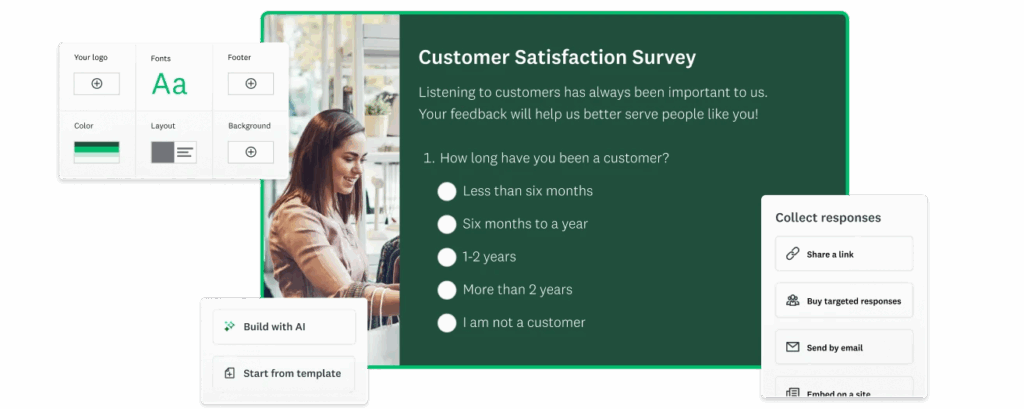
Key Features
- Template Library: Offers a broad selection of ready‑made surveys for fast setup.
- Automation Workflows: Delivers results to Excel, Slack, Teams, and Google Sheets.
- Collaborative Tools: Enables shared editing, commenting, and response alerts in team plans.
- AI‑powered Analytics: Includes sentiment analysis, thematic grouping, and industry benchmarks.
- Integrations: Works with Microsoft Office, Google Drive, Slack, Mailchimp, and CRM.
Pricing

SurveyMonkey offers a free plan for basic use,
- Individual Plans: From $34/month, unlimited surveys, 15k–40k responses/year, advanced logic, and randing tools.
- Team Plans: From $25/user/month, 50k–100k responses/year, collaboration features, integrations, and white labeling.
- Enterprise: Custom pricing with advanced admin controls, security, compliance, and premium integrations.
Pros
- Templates speed survey creation across various use cases.
- Automation sends data to key platforms instantly.
- Collaboration tools streamline team workflows.
- AI filters help uncover insights fast.
- Extensive integration avoids isolating data.
- Real‑time tracking keeps teams informed continuously.
Cons
- Limited design and branding customization compared to modern form builders
- Mobile experience can feel clunky for respondents on longer surveys
10. Zoho Forms
Zoho Forms is a drag‑and‑drop form builder within the Zoho ecosystem, designed for businesses that need flexible data capture and automation. It supports offline data collection, geolocation tagging, QR code scanning, e‑signatures, and payment.

Zoho’s form builder also integrates with external apps, making it versatile for workflows across marketing, HR, operations, and sales.
Key Features
- Drag‑and‑Drop Builder: Lets you design forms fast with no coding required.
- Offline and Mobile Support: Captures data without internet, uses QR/barcode scanning.
- Workflow Automation: Sends notifications and connects with Zoho CRM, Campaigns, and more.
- Payment & e‑Signatures: Accepts payments via PayPal or Stripe and collects digital signatures.
- Templates & Customization: Offers ready‑made templates, themes, branding, and rules logic.
- Analytics and Reports: Built‑in real‑time reports, charts, and response tracking.
Pricing
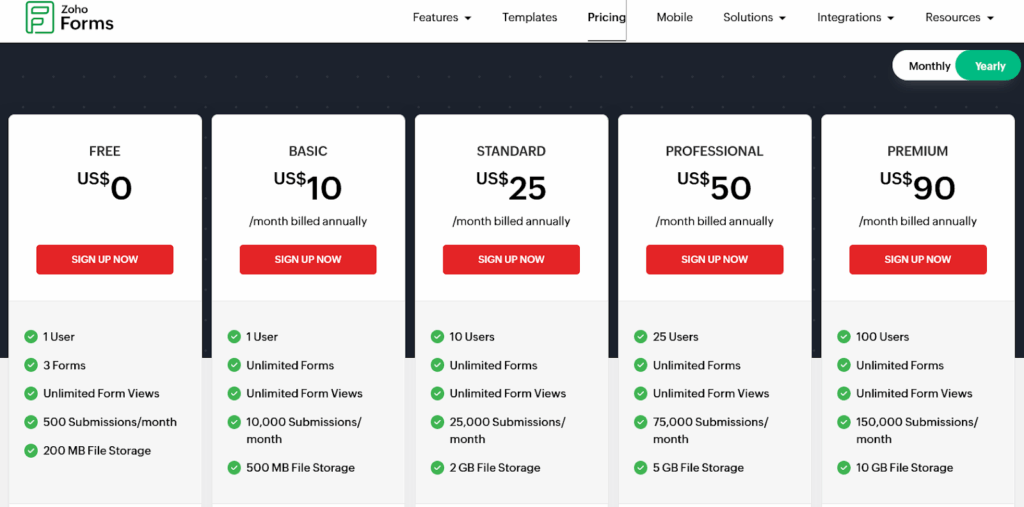
Plans range from a free version with generous features like payments and integrations, to paid tiers: Basic, Standard, Professional, and Premium, starting at $10/month, billed annually. Higher tiers add more users, submissions, storage, and audit or scheduling tools.
Pros
- Friendly interface speeds up form creation for beginners
- Extensive integrations streamline workflows across apps
- Automation features elevate data collection and follow‑ups
- Strong offline, mobile, and QR support boosts versatility
- Good value with payments and e-signatures included in the free plan
Cons
- Heavy reliance on the Zoho ecosystem may feel restrictive if you use third-party tools
- Complex and advanced workflows can be difficult for non-tech users to configure
- Occasional performance lags when working with large forms or datasets
Why Might Businesses Need a Formstack Alternative?
Here are a few reasons why businesses might be looking for alternatives to Formstack:
Lack of Variety of Field Types
While Formstack offers a versatile platform for form building, many users have noted that it lacks a variety of field types commonly found in more advanced tools like Growform.
This limitation forces businesses to switch between different platforms for data collection, reducing efficiency. Here’s a user review from Capterra.

Overwhelming Technical Details
While Formstack has many powerful features, users have criticized its complexity. Some claim the amount of technical details can be overwhelming to handle, especially with integrations and external workflows. Here’s a user review from G2:

Limited Template Availability
Formstack has many impressive features, but users have pointed out that the platform lacks sufficient templates. Alternatives like Growform offer many customizable templates for easier and faster form creation for businesses in event planning, finance, HVAC, life insurance, mortgages, and more.
Outdated Appearance
While Formstack is reliable and mostly problem-free, the forms created often look outdated, “resembling designs from the early 2000s.” Users would prefer alternatives like Growform, which lets them create multi-step forms that look great on any device. Here’s a user review from Capterra:

Capture Leads Better With Growform
While Formstack offers a range of features, users have expressed frustration with its complexity, outdated designs, and limited field types.
Growform is a superior alternative, providing sleek, modern forms designed to capture leads efficiently. With easy-to-use templates, flexible field options, and seamless integrations, our form builder allows businesses and individuals to create professional, high-converting forms without the technical hassle.
Start using Growform for free today.
Recent Posts
- Anatomy of a Landing Page: 12 Essential Elements for Higher Conversions
- 8 Best Webinar Landing Page Examples to Boost Signups
- 10 Best ClickFunnels Landing Page Examples That Actually Convert
- How to Improve Landing Page Optimization and Boost Conversions
- Landing Page Metrics That Matter: 12 KPIs to Boost Conversions
